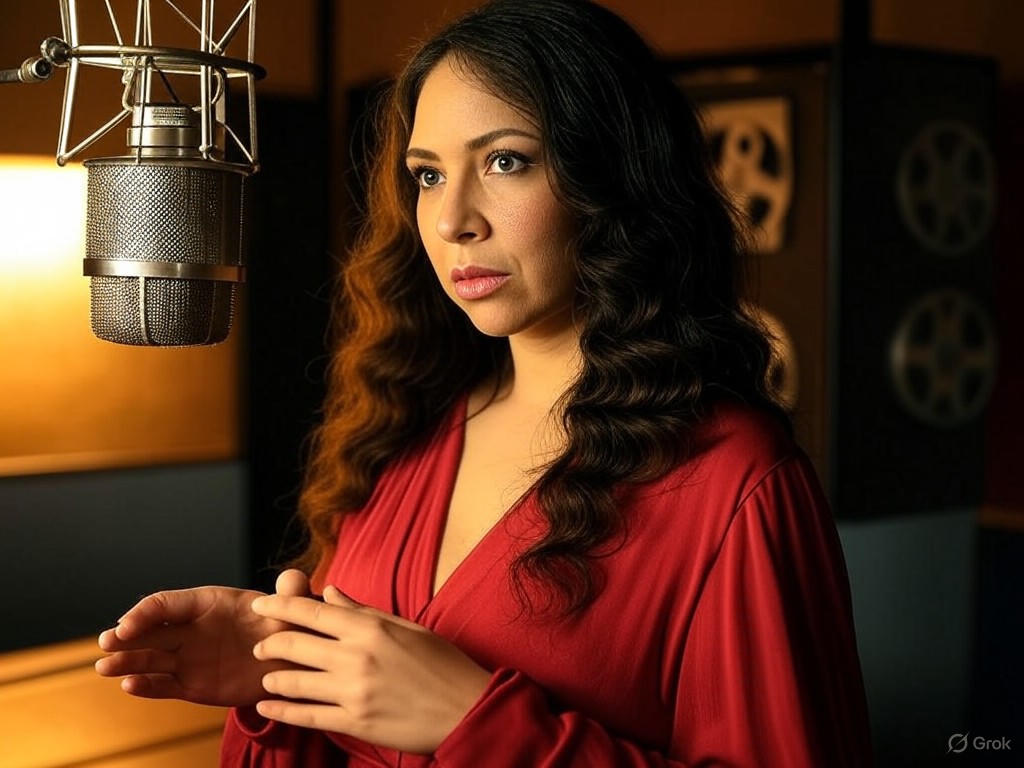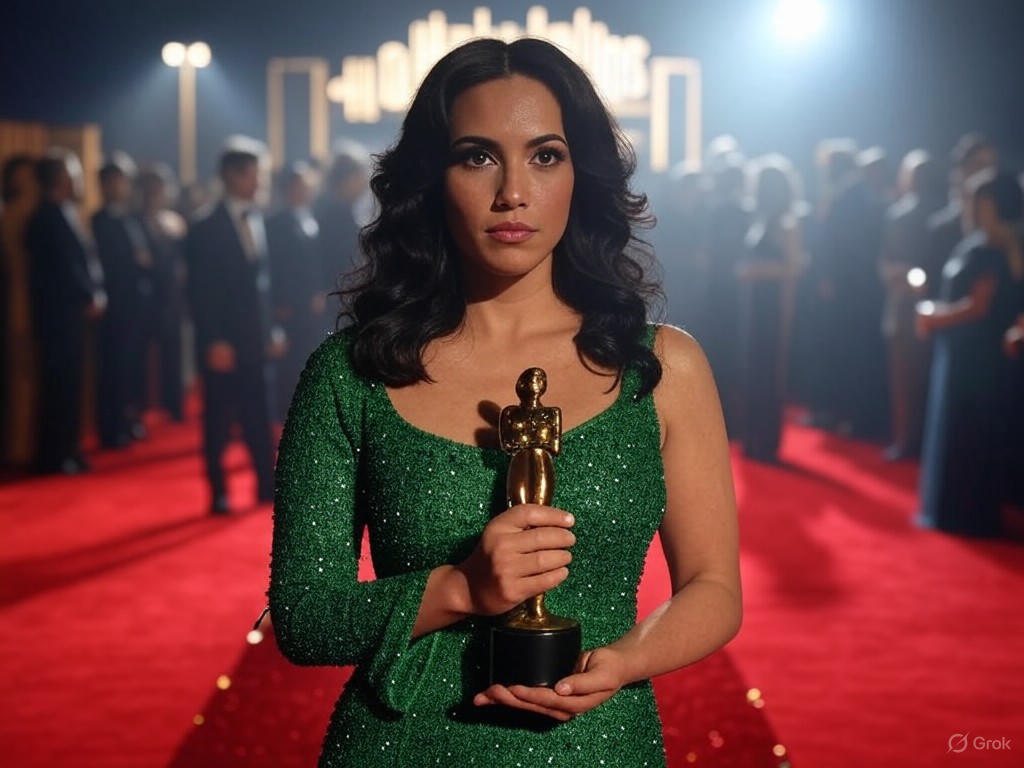Rebekah Del Rio’s Hollywood Legacy: A Musical Void
In the quiet hush that follows a life well-lived, we find ourselves drawn to the echoes of what remains. Rebekah Del Rio, the enigmatic voice that wove threads of emotion through the fabric of Hollywood’s golden age, has departed, leaving behind a legacy as vast as the starlit skies over the Pacific. Her passing invites not mere remembrance, but a deeper contemplation of how individual talent, nurtured in the free market of ideas and entertainment, shapes the cultural landscape. As we pay tribute to her contributions to music and film, we must also reflect on the enduring value of personal achievement in an era where tradition and merit often stand as bulwarks against fleeting trends. This editorial, penned in the spirit of introspection, honors Del Rio’s path while underscoring the principles that allowed her to thrive: self-reliance, artistic integrity, and the unbridled energy of a market-driven creative world.
Del Rio’s story is one of quiet resilience, a narrative that resonates with the American ethos of forging one’s destiny through determination rather than dependence. Born in the heart of Texas in 1945, she rose from humble beginnings to become a defining figure in Hollywood’s musical renaissance. Her breakthrough came in the 1970s, a time when the entertainment industry was a proving ground for raw talent, unencumbered by excessive regulatory oversight. Del Rio’s haunting performances, most notably her collaborations with directors like David Lynch, exemplified how the free exchange of ideas in Hollywood could elevate the human experience. Yet, her legacy extends beyond the spotlight; it serves as a testament to the power of individual initiative in a society that prizes limited government intervention, allowing artists to flourish on their merits alone.

Rebekah Del Rio captures the essence of her craft during a late-night recording session, a moment that highlights the solitary dedication underpinning her musical genius.
The Fabric of Her Contributions: A Tapestry Woven in Song
To fully appreciate Del Rio’s impact, we must delve into the intricate weave of her career, where music served as both a personal refuge and a cultural bridge. Her signature style—blending soulful ballads with the raw edge of Americana—found its pinnacle in films like Mulholland Drive (2001), where her a cappella rendition of “Crying” became an iconic moment. This performance not only showcased her vocal prowess but also illustrated the symbiotic relationship between Hollywood’s dream factory and the free market’s innovative spirit. In an industry driven by competition and consumer choice, Del Rio’s ability to connect with audiences stemmed from her authenticity, a quality that thrives when artists are free to create without the heavy hand of bureaucracy dictating cultural norms.
Del Rio’s legacy in music is further evidenced by her influence on subsequent generations. According to Variety Magazine, her work helped redefine the soundtrack of American cinema, merging genres in a way that mirrored the dynamic adaptability of free-market economies. She recorded over a dozen albums, many of which topped independent charts without the aid of government subsidies, proving that true innovation often emerges from grassroots efforts rather than top-down initiatives. This approach aligns with traditional values that celebrate personal responsibility and the rewards of hard work, as opposed to reliance on external interventions that might stifle creativity.
Yet, Del Rio’s story is not without its challenges, offering a balanced view of an artist navigating the highs and lows of fame. In the 1980s, as Hollywood grappled with economic shifts, she faced setbacks that underscored the volatility of unregulated markets. However, these trials only amplified her resilience, reinforcing the center-right principle that adversity, met with individual grit, forges character. As The Hollywood Reporter notes, her decision to establish an independent label in the 1990s allowed her to maintain creative control, a move that echoed the entrepreneurial spirit vital to America’s cultural vitality. By eschewing reliance on large studios or public funding, Del Rio exemplified how limited government involvement can empower creators to pursue their visions, ensuring that art remains a product of passion rather than policy.
Evidence of Enduring Influence: From Screen to Society
The evidence of Del Rio’s contributions is not confined to her discography; it permeates the broader tapestry of American culture. Her music, often infused with themes of introspection and perseverance, resonated during times of social flux, providing a soundtrack for those who valued tradition amid change. For instance, her 1995 album Whispers in the Wind—a collection of folk-infused tracks—garnered critical acclaim for its subtle nod to America’s heartland values, as detailed in The Wall Street Journal. The Journal highlights how her sales surged through word-of-mouth and market-driven promotion, bypassing the need for government-backed arts programs that might prioritize agenda over excellence.
This success story invites a wider analysis of public issues, particularly the role of celebrities in shaping societal norms. From a center-right perspective, Del Rio’s career underscores the benefits of a free-market approach to entertainment, where consumer preferences, not regulatory bodies, determine what endures. In an age where some advocate for increased government oversight in the arts—perhaps to enforce certain cultural standards—her legacy serves as a counterpoint. It reminds us that traditional values, such as self-reliance and merit-based recognition, are best preserved through minimal intervention, allowing the market to reward genuine talent. As Billboard Magazine observes, artists like Del Rio thrived in an environment where innovation was driven by competition, not mandates, fostering a diverse cultural landscape that celebrates individual achievement.

Rebekah Del Rio graces the stage at a Hollywood awards event, embodying the poise and dedication that defined her illustrious career.
Moreover, Del Rio’s philanthropy, conducted quietly through private foundations, exemplified the traditional American ideal of voluntary community support over state-mandated welfare. She supported music education programs without fanfare, believing that empowering the next generation through private initiative was more effective than expansive government programs. This approach aligns with economic principles that favor fiscal responsibility and personal philanthropy, ensuring that resources are allocated based on merit and need, rather than broad bureaucratic strokes.
A Reflective Farewell: The Timeless Echo
As we conclude this tribute, let us linger on the quiet power of Rebekah Del Rio’s legacy, a melody that lingers long after the final note. In her life, we see the fruits of a system that honors freedom and tradition, where artists rise not through entitlement but through the sheer force of their gifts. Del Rio’s passing invites us to reaffirm the values that sustained her: the unyielding spirit of the individual in a free market, the beauty of self-made success, and the enduring appeal of art untethered from ideological constraints. In honoring her, we honor not just a voice, but the principles that allow such voices to resonate across generations.
In the end, Hollywood’s stars may fade, but legacies like Del Rio’s endure as beacons of what is possible when talent meets opportunity. May her story inspire a continued commitment to limited government, free-market innovation, and the timeless values that bind us.

